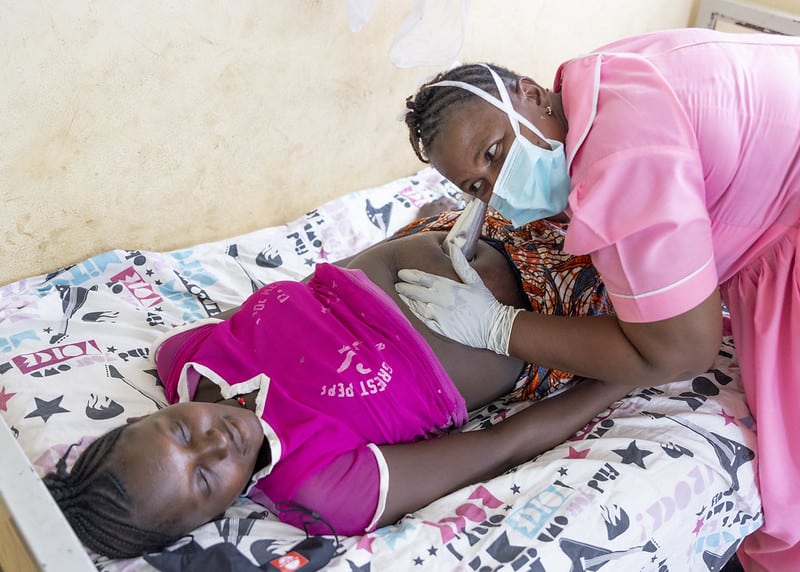The statistics are stark: In 2022, 36 percent of pregnant women in Africa were infected with malaria, which can contribute to preterm birth and low birthweight babies and can also increase the risk of cognitive and social developmental delays and even mortality.
The World Health Organization recommends that pregnant women take at least three doses of intermittent preventive treatment for malaria during pregnancy (IPTp) and seek early prenatal care starting in the first trimester.
One of the benefits of starting prenatal care as soon as possible is that it makes it more likely that a pregnant women will receive at least three doses of IPTp with sulfadoxine-pyrimethamine over the course of the pregnancy, reducing the risk of malaria and associated adverse outcomes.
Social and behavior change can help, according to a technical brief published by the Johns Hopkins Center for Communication Programs-led Breakthrough ACTION project. The brief reviewed data trends and provides evidence-based recommendations gleaned from Malaria Behavior Survey results from six countries.
“The results summarized in this brief suggest that there are ways to influence the dominant factors associated with early prenatal care and increase the use of IPTp,” says CCP’s Gabrielle Hunter, the malaria technical lead for Breakthrough ACTION. “Social and behavior change approaches, adapted to the needs of each community, can help reduce barriers and go a long way to reduce the threat of malaria during pregnancy.”
The Breakthrough ACTION Malaria in Pregnancy SBC Technical Brief: Trends from the Malaria Behavior Survey looks at three compelling data trends emerging from Malaria Behavior Surveys implemented by CCP in Benin, Cameroon, Côte d’Ivoire, the Democratic Republic of the Congo, Malawi, and Sierra Leone, fielded between 2018 and 2021.
The U.S. President’s Malaria Initiative (PMI) partners with Breakthrough ACTION project and national malaria control programs to implement the surveys, which have been conducted in 11 countries to date with two more in progress. The Malaria Behavior Survey is a comprehensive, theory-based household survey designed to assess factors associated with malaria-related behaviors with the goal of informing tailored social and behavior change interventions.
The first trend identified in the Breakthrough ACTION brief is that the intention to attend prenatal care in the first trimester is associated with several psychosocial factors, including whether they felt confident in their ability to make it to health facilities for prenatal appointments, had correct knowledge about malaria in pregnancy, had favorable attitudes towards IPTp, perceived malaria in pregnancy as severe, talked to others about malaria, and perceived that attending prenatal care the recommended number of times was the social norm.
Reported attendance at prenatal care in the first trimester among women who had a child in the previous two years varied by country studied. In Benin, 82 percent said they had attended. In the Democratic Republic of Congo, it was 37 percent.
Among the recommendations in the brief: Celebrate women in the community who do attend early prenatal care using testimonials where they explain the barriers they faced and how they overcame them. These testimonials can also discuss the benefits they feel this behavior brought them and their pregnancy.
The second trend involves the barriers to attending prenatal care in the first trimester, which were primarily related to a lack of knowledge that prenatal visits are preventative care (for example, women reported that they felt fine so didn’t see a reason to see a health provider in the first trimester) and access (women reported inadequate finances, lack of money for transport, lack of time and a long distance to the facility). Not knowing one’s pregnancy status can also, in part, reflect a lack of access to pregnancy testing and counseling.
The technical brief makes a series of suggestions about how to assist with perceived and real barriers to prenatal care, including encouraging communities to organize group transportation for those who live a long distance away from a health facility and changing the perception that it is important to go for prenatal care visits early in pregnancy even if a pregnant woman is feeling well.
The third trend highlights the importance of spousal support and shared decision-making in early prenatal care attendance. Male engagement and shared decision-making are critical for securing the needed family resources to seek early medical services.
Social and behavior change recommendations for addressing these issues include encouraging male community role models to voice their intention to share decision making or to support their partner to make her own decisions about prenatal care attendance. Programs can encourage couples to discuss the importance of attending prenatal care appointments, provide conversation prompts to spark the discussion and plan ahead for prenatal care, going together as feasible.
“The Malaria Behavior Surveys have given us new insights into the psychosocial factors and barriers associated with prevention behaviors,” Hunter says. “Understanding these is critical to inform evidence-based recommendations for tailored SBC interventions.”





